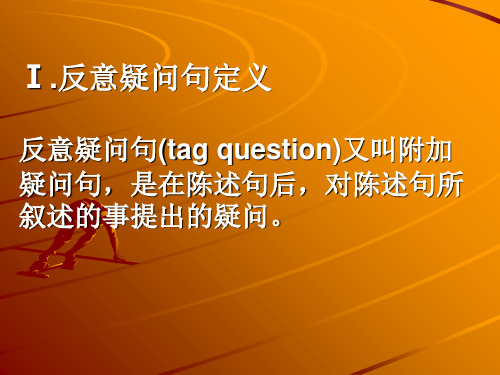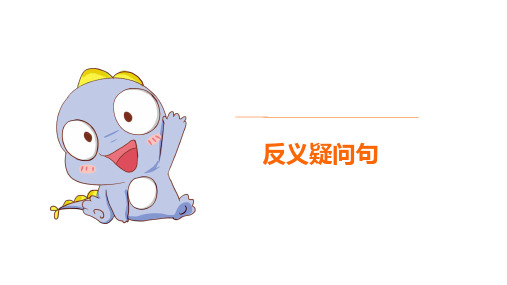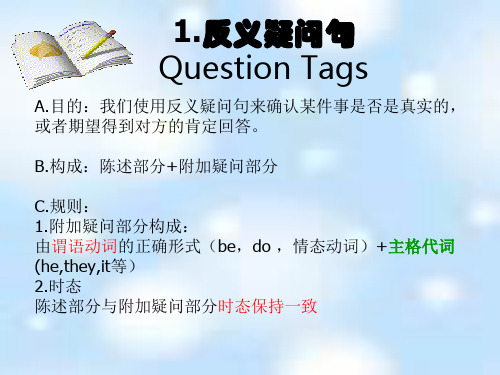反义疑问句归纳总结.ppt
合集下载
反义疑问句最全PPT课件

3.陈述部分由neither… nor, either… or 连接的并列主语 时,疑问部分根据其实际逻辑意义而定。
Neither you nor I am engineer, are we?
4.陈述部分主语是指示代词或不定代词everything, that, nothing, this, 疑问部分主语用it。
(二)陈述部分有表示过去的时间状语,疑问部分的动词 就用一般过去时。(didn’t + 主语) She must have read the novel last week, didn’t she?
b 表示否定推测时,否定式通常不是must not,而是 can’t (cannot) He can’t have been to your home because he doesn't know your address, does he?
6.否定前缀不能视为否定词,其反意疑问句仍用否定形式。 It is impossible, isn’t it? He is not unkind to his classmates, is he?
7.当主句是由so引起的一个句子,而且译为“这么说来” 时,疑问部分的谓语形式(肯定或否定)应与主句保持一 致。 So you have seen the film, have you? So he has not been to Beijing, has he?
b. 带有定语从句,宾语从句的主从复合句,疑问部分谓 语根据主句的谓语而定 He is not the man who gave us a talk, is he? He said he wanted to visit Japan, didn’t he?
c. 上述部分主句是由谓语think, believe, expect, suppose, imagine等引导的宾语从句,疑问部分与宾语 从句相对应构成反意疑问句 I don't think he is bright, is he? We believe she can do it better, can't she?
反义疑问句详细讲解课件(PPT27张)

I don’t believe he has finished his work.
7.当陈述部分的主句是I think (expect, believe)等结构时,反 意疑问句的附加部分则往往与从 句中的主语和谓语动词保持对应 关系,但要注意否定的转移。 例如:
I think he’s funny, isn’t he? I don’t believe she likes my
You must have seen the film last week, didn’t you?
6. 当陈述部分是I am…时,反意疑 问句部分通常要用aren’t I;如陈述 句部分的主语是I am not时,反意疑 问句部分通常要用am I。 例如:
1)I am a teacher, aren’t I?
Ⅰ.反意疑问句定义
反意疑问句(tag question)又叫附加 疑问句,是在陈述句后,对陈述句所 叙述的事提出的疑问。
Ⅱ.基本结构:
陈述句+逗号+简短的一般疑问句?
遵循前肯定后否定前否后肯式的原则
①前肯后否式。例如:
You are all students, aren’t you﹖
②前否后肯式。例如:
Let’s have a rest, shall we? 以let us开头的祈使句,不包括 说话人在内,因此反意疑问句的 附加部分用will you。例如:
Let us stop now, will you?
Ⅳ. 反意疑问句的回答 “ 根据事实回答”
对反意疑问句的回答,无论问题的提法如何,如果 事实是肯定的,就用yes,事实是否定的,就要用no。 要特别注意陈述句部分是否定结构,反意疑问句部分 用肯定式提问时,回答yes或no与汉语正好相反。这 种省略回答的yes要译成“不”,no要译成“是”。
7.当陈述部分的主句是I think (expect, believe)等结构时,反 意疑问句的附加部分则往往与从 句中的主语和谓语动词保持对应 关系,但要注意否定的转移。 例如:
I think he’s funny, isn’t he? I don’t believe she likes my
You must have seen the film last week, didn’t you?
6. 当陈述部分是I am…时,反意疑 问句部分通常要用aren’t I;如陈述 句部分的主语是I am not时,反意疑 问句部分通常要用am I。 例如:
1)I am a teacher, aren’t I?
Ⅰ.反意疑问句定义
反意疑问句(tag question)又叫附加 疑问句,是在陈述句后,对陈述句所 叙述的事提出的疑问。
Ⅱ.基本结构:
陈述句+逗号+简短的一般疑问句?
遵循前肯定后否定前否后肯式的原则
①前肯后否式。例如:
You are all students, aren’t you﹖
②前否后肯式。例如:
Let’s have a rest, shall we? 以let us开头的祈使句,不包括 说话人在内,因此反意疑问句的 附加部分用will you。例如:
Let us stop now, will you?
Ⅳ. 反意疑问句的回答 “ 根据事实回答”
对反意疑问句的回答,无论问题的提法如何,如果 事实是肯定的,就用yes,事实是否定的,就要用no。 要特别注意陈述句部分是否定结构,反意疑问句部分 用肯定式提问时,回答yes或no与汉语正好相反。这 种省略回答的yes要译成“不”,no要译成“是”。
反义疑问句专题讲解PPT课件

Welcome to my class !
I think learning English is very painful,isn’t it ?
反义疑问句
反义疑问句
(The Disjunctive Question)又 叫附加疑问句。它表示提问人的 看法,没有把握,需要对方证实。 反义疑问句由两部分组成:前一 部分是一个陈述句,后一部分是 一个简短的疑问句,两部分的人 称时态应保持一致。
Let’s have a summary
反义疑问句遵循前肯后否,前否 后肯的规则。即前面是肯定句, 后面就是否定句。前面是否定句,
后面就是肯定句。
下面让我们来看一些特殊的 反义疑问句
Are you ready ?
一、 陈述部分的主语everything, noth分的主语应用it.
You mustn’t walk on grass, must you ?
3) 如must have done 的结构,前句强调对 过去情况的猜测时(一般有过去时间状语) 附加部分用 didn’t + 主语。如果前句强调 动 作 的 完 成 , 附 加 部 分 则 用 haven’t (hasn’t ) + 主语。 He must have met her yesterday, didn’t he ? You must have been to Beijing, haven’t you ?
He was unsuccessful, wasn’t he? Tom dislikes the book, doesn’t he?
四、陈述部分的谓语是used to 时,疑问部分用 didn't +主语或 usedn't +主语。
The old man used to smoke, didn’t he或 usedn’t he ?
I think learning English is very painful,isn’t it ?
反义疑问句
反义疑问句
(The Disjunctive Question)又 叫附加疑问句。它表示提问人的 看法,没有把握,需要对方证实。 反义疑问句由两部分组成:前一 部分是一个陈述句,后一部分是 一个简短的疑问句,两部分的人 称时态应保持一致。
Let’s have a summary
反义疑问句遵循前肯后否,前否 后肯的规则。即前面是肯定句, 后面就是否定句。前面是否定句,
后面就是肯定句。
下面让我们来看一些特殊的 反义疑问句
Are you ready ?
一、 陈述部分的主语everything, noth分的主语应用it.
You mustn’t walk on grass, must you ?
3) 如must have done 的结构,前句强调对 过去情况的猜测时(一般有过去时间状语) 附加部分用 didn’t + 主语。如果前句强调 动 作 的 完 成 , 附 加 部 分 则 用 haven’t (hasn’t ) + 主语。 He must have met her yesterday, didn’t he ? You must have been to Beijing, haven’t you ?
He was unsuccessful, wasn’t he? Tom dislikes the book, doesn’t he?
四、陈述部分的谓语是used to 时,疑问部分用 didn't +主语或 usedn't +主语。
The old man used to smoke, didn’t he或 usedn’t he ?
反义疑问句(共14张PPT)全

二、前否+后肯
1.She wasn’t ill last week, was she ? 2.It doesn’t often rain here, does it? 3.Tom won’t go to Shanghai next year,
will he ?
特殊用法1—祈使句的反义疑问句
1、肯定祈使句的反意疑问句,疑问部分用will you或won’t you,否定祈使句则用will you ? 如: Don't do that again, will you? Go with me, will you / won't you?
13、He who seize the right moment, is the right man.谁把握机遇,谁就心想事成。2024/10/172024/10/172024/10/172024/10/1710/17/2024 +14、谁要是自己还没有发展培养和教育好,他就不能发展培养和教育别人。2024年10月17日星期四2024/10/172024/10/172024/10/17 +15、一年之计,莫如树谷;十年之计,莫如树木;终身之计,莫如树人。2024年10月2024/10/172024/10/172024/10/1710/17/2024 +16、教学的目的是培养学生自己学习,自己研究,用自己的头脑来想,用自己的眼睛看,用自己的手来做这种精神。2024/10/172024/10/17October 17, 2024 +17、儿童是中心,教育的措施便围绕他们而组织起来。2024/10/172024/10/172024/10/172024/10/17
一 、前肯+后否 含be动词
1.He is a doctor, isn’t he? 2.I am Chinese, aren’t I?
中考英语反义疑问句课件

B. could she
C. can she
3. Alice had a wonderful time yesterday,_______?
A. hadn't she
B. wasn't she
C. didn't she
D. wouldn't she
☆☆☆☆ 1. You are an actor, _are_ _you_ ? 2. It was fine yesterday, wasn't it ? 3.Tom has never came to China , has he ? 4.Everyone stands outside today, don't they ?
反义疑问句
导入
The girl is crying, does she
?
• 没理解什么是反义疑问句,形式和结构,以及做这样题目的技巧 方法。
It’s cold ,___________?
It’s cold ,___is_n_’_t _it____?
You live in a small town ,
第三步,反义疑问句的主语要变成代词形式,he, she, it, they, we等,如果是there be 结构,there直接落下
课后练习
1. The pen is yours,_isn't_ _it_? 2. Lucy likes English, doesn't she ? 3. Your sister helped him, didn't she ? 4. He never gets up late, does he? 5. Don’t go out at night, will you? 6. He never loves cold weather, does he? 7. You finished the task yesterday, didn't you? 8. The story is little interesting, is it ? 9. Everything starts to grow in spring, don't they? 10. He can hardly finish his homework, can he?
反义疑问句PPT课件

陈述部分
疑问部分
mustn't表示“禁止,不可, 不必”时
must
例句
You mustn't stop your car here,must you?
must表示“有必要”时
needn't
They must finish the work today,needn't they?
当must用来表示对现在的 情况进行推测时
She must have read the novel last week,didn't she?
Your daughter must have 要用“haven't/hasn't+主语”。 been to Africa, hasn't
she ?
You must be tired , _ar_e_n’_t _yo_u___ ?
2) 祈使句式反意疑问句
Let’s go home,_s_h_a_ll_w_e_? Let us go,__w__il_l _yo_u__? Let me go,_w__il_l _y_ou__? Come here please, __w_i_ll_y_o_u__? Never ask her again,_w__il_l /_c_a_n__y_ou__?
语
there, didn't he? / usedn't he?
had better(最好) + v.
hadn't you?
would rather(宁可、宁愿) +v.
wouldn't +主语
You'd like to +v.
反义疑问句详细讲解课件(PPT27张)

2) have to表示“不得不,必须”之意 时,附加问句的谓语应用助动词do.
Kate has to help her mother at home,doesn’t she?
3) have表示“吃,喝,玩,度过”等意 思时,其附加问句的谓语应用助动词do.
They had a good time in Beijing ,didn’t they?
Ⅰ.反意疑问句定义
反意疑问句(tag question)又叫附加 疑问句,是在陈述句后,对陈述句所 叙述的事提出的疑问。
Ⅱ.基本结构:
陈述句+逗号+简短的一般疑问句?
遵循前肯定后否定前否后肯式的原则
①前肯后否式。例如:
You are all students, aren’t you﹖
②前否后肯式。例如:
[误] Tom can speak Chinese well, can’t Tom﹖
[正] Tom can speak Chinese well, can’t he﹖
一般现在时:
Lily likes going shopping, d_o_e_s_n__’t_she? They aren’t students, __a_r_e___
You must have seen the film last week, didn’t you?
6. 当陈述部分是I am…时,反意疑 问句部分通常要用aren’t I;如陈述 句部分的主语是I am not时,反意疑 问句部分通常要用am I。 例如:
1)I am a teacher, aren’t I?
The End
They must come on time,needn’t they?
2)must表示推测,“一定,想必”之意,附加问 句的谓语动词的确定应根据must后面的动词。
Kate has to help her mother at home,doesn’t she?
3) have表示“吃,喝,玩,度过”等意 思时,其附加问句的谓语应用助动词do.
They had a good time in Beijing ,didn’t they?
Ⅰ.反意疑问句定义
反意疑问句(tag question)又叫附加 疑问句,是在陈述句后,对陈述句所 叙述的事提出的疑问。
Ⅱ.基本结构:
陈述句+逗号+简短的一般疑问句?
遵循前肯定后否定前否后肯式的原则
①前肯后否式。例如:
You are all students, aren’t you﹖
②前否后肯式。例如:
[误] Tom can speak Chinese well, can’t Tom﹖
[正] Tom can speak Chinese well, can’t he﹖
一般现在时:
Lily likes going shopping, d_o_e_s_n__’t_she? They aren’t students, __a_r_e___
You must have seen the film last week, didn’t you?
6. 当陈述部分是I am…时,反意疑 问句部分通常要用aren’t I;如陈述 句部分的主语是I am not时,反意疑 问句部分通常要用am I。 例如:
1)I am a teacher, aren’t I?
The End
They must come on time,needn’t they?
2)must表示推测,“一定,想必”之意,附加问 句的谓语动词的确定应根据must后面的动词。
英语语法反义疑问句ppt

祈使句的反意疑问句
肯定的祈使句:won’t you ? / will you ? 祈使句的反意疑问句
否定的祈使句:will you ? 注:Let’s … , shall we?
Let us…, will you? e.g. Let us go to watch the movie, will you ? Let’s walk to the shops instead of taking the car, shall we ? Don't play computer games, will you?
B. is she
C. did she C. hasn’t he C. did she C. don’t they C. hasn’t she
D. wasn’t she D. doesn’t he D. didn’t she D. will they D. has she
6. There won’t be any concert this Saturday evening, C ?
A. will there not
B. will there C. is there
D. won’t there
7. He dislikes the two subjects, B he?
A. does
B. doesn’t
C. is
8. Let’s go there by bus, B ?
D. isn’t
特殊的反意疑问句
特殊的反意疑问句: (1) 主+ used to do sth, didn't/usedn't+主?
She used to get up at 7 o'clock, didn't/usedn't she ?
- 1、下载文档前请自行甄别文档内容的完整性,平台不提供额外的编辑、内容补充、找答案等附加服务。
- 2、"仅部分预览"的文档,不可在线预览部分如存在完整性等问题,可反馈申请退款(可完整预览的文档不适用该条件!)。
- 3、如文档侵犯您的权益,请联系客服反馈,我们会尽快为您处理(人工客服工作时间:9:00-18:30)。
The Swede made no answer, did he / she? Some plants never blown, do they ?
There are few apples in the basket, are there?
He can hardly swim, can he?
They seldom come late, do they?
He is not the man who gave us a talk, is he? He said he wanted to visit Japan, didn't he?
c. 上述部分主句谓语是I ;we think, believe, expect, suppose, imagine 等引 导的宾语从句,疑问部分与宾语从句相 对应构成反意疑问句。
to you in English, does she? She rarely speaks
4)含有ought to 的反意疑问句,陈述 部分是肯定的,疑问部分用shouldn't / oughtn't +主语。
He ought to know what to do, oughtn't he? / shouldn't he?
Either you or he is right,_is_n_’_t_h_e_?
13)陈述部分主语是指示代词或不定代 词 everything, that, this nothing, 疑问 部分主语用 it 。
Everything is ready, isn't it?
14)陈述部分为主语从句或并列复合句, 疑问部分有三种情况s Mr. Smith had been to Beijing for several times, he should have been in China now, shouldn't he?
b.带有定语从句,宾语从句的主从 复合句,疑问部分谓语根据主句的 谓语而定:
I am a student, aren’t I?
2)陈述部分的谓语是wish,疑问部分 要用may +主语
I wish to have a word with you, may I?
3)陈述部分用 no, nothing, nobody, never, few, seldom, hardly, rarely, little 等否定含义的词时,疑问部分用肯定 含义。
5)陈述部分有 have to + v. (had to + v.), 疑问部分常用don't +主语(didn't + 主语)。
We have to get there at eight tomorrow, don't we?
They had to cross the busy street, didn’t they?
2.陈述部分否定式 + 疑问部分肯定 式 You didn’t go, did you?
He can’t ride a bike, can he?
请注意以下句型的反义疑问句的 用法:
1)陈述部分的主语是I,疑问部分要 用 aren't I. I’m as tall as your sister, aren't I?
You'd better read it by yourself, hadn't you?
You’d better get up early, hadn’t you?
8)陈述部分有would rather + v.疑问部 分多用 wouldn't +主语。
He would rather read it ten times than recite it, wouldn't he?
反义疑问句
(The Disjunctive Question)又叫 附加疑问句。它表示提问人的看法, 没有把握,需要对方证实。反义疑 问句由两部分组成:前一部分是一 个陈述句,后一部分是一个简短的 疑问句,两部分的人称时态应保持 一致。
1.陈述部分肯定式 + 疑问部分否定式 They work here, don’t they? She was ill yesterday, wasn’t she?
I don't think he is bright, is he? We believe she can do it better, can't she?
15) 陈述部分主语是不定代词 everybody, anyone, somebody, nobody, no one等,疑问部分常用复数they,有 时也用单数he。
It must be going to rain tomorrow, won't it?
11) 感叹句中,疑问部分用be +主语。 What colours, aren't they? What a smell, isn't it?
12)陈述部分由neither… nor, either… or 连接的并列主语时,疑问部分根 据其实际逻辑意义而定。 Neither you nor I am engineer, are we?
6)陈述部分的谓语是used to 时,疑 问部分用didn't +主语或 usedn't +主 语。
He used to take pictures there, didn't he?
She used to stay up late, usedn’t she?
7)陈述部分有had better + v. 疑问句 部分用hadn't you?
9)陈述部分有You'd like to + v. 疑问 部分用wouldn't +主语。
You’d like to go with me, wouldn't you?
10)must在表示"推测"时,根据其推测 的情况来确定反意疑问句。 He must be a doctor, isn't he? You must have studied English for three years, haven't you? He must have finished it yesterday, didn't he?
There are few apples in the basket, are there?
He can hardly swim, can he?
They seldom come late, do they?
He is not the man who gave us a talk, is he? He said he wanted to visit Japan, didn't he?
c. 上述部分主句谓语是I ;we think, believe, expect, suppose, imagine 等引 导的宾语从句,疑问部分与宾语从句相 对应构成反意疑问句。
to you in English, does she? She rarely speaks
4)含有ought to 的反意疑问句,陈述 部分是肯定的,疑问部分用shouldn't / oughtn't +主语。
He ought to know what to do, oughtn't he? / shouldn't he?
Either you or he is right,_is_n_’_t_h_e_?
13)陈述部分主语是指示代词或不定代 词 everything, that, this nothing, 疑问 部分主语用 it 。
Everything is ready, isn't it?
14)陈述部分为主语从句或并列复合句, 疑问部分有三种情况s Mr. Smith had been to Beijing for several times, he should have been in China now, shouldn't he?
b.带有定语从句,宾语从句的主从 复合句,疑问部分谓语根据主句的 谓语而定:
I am a student, aren’t I?
2)陈述部分的谓语是wish,疑问部分 要用may +主语
I wish to have a word with you, may I?
3)陈述部分用 no, nothing, nobody, never, few, seldom, hardly, rarely, little 等否定含义的词时,疑问部分用肯定 含义。
5)陈述部分有 have to + v. (had to + v.), 疑问部分常用don't +主语(didn't + 主语)。
We have to get there at eight tomorrow, don't we?
They had to cross the busy street, didn’t they?
2.陈述部分否定式 + 疑问部分肯定 式 You didn’t go, did you?
He can’t ride a bike, can he?
请注意以下句型的反义疑问句的 用法:
1)陈述部分的主语是I,疑问部分要 用 aren't I. I’m as tall as your sister, aren't I?
You'd better read it by yourself, hadn't you?
You’d better get up early, hadn’t you?
8)陈述部分有would rather + v.疑问部 分多用 wouldn't +主语。
He would rather read it ten times than recite it, wouldn't he?
反义疑问句
(The Disjunctive Question)又叫 附加疑问句。它表示提问人的看法, 没有把握,需要对方证实。反义疑 问句由两部分组成:前一部分是一 个陈述句,后一部分是一个简短的 疑问句,两部分的人称时态应保持 一致。
1.陈述部分肯定式 + 疑问部分否定式 They work here, don’t they? She was ill yesterday, wasn’t she?
I don't think he is bright, is he? We believe she can do it better, can't she?
15) 陈述部分主语是不定代词 everybody, anyone, somebody, nobody, no one等,疑问部分常用复数they,有 时也用单数he。
It must be going to rain tomorrow, won't it?
11) 感叹句中,疑问部分用be +主语。 What colours, aren't they? What a smell, isn't it?
12)陈述部分由neither… nor, either… or 连接的并列主语时,疑问部分根 据其实际逻辑意义而定。 Neither you nor I am engineer, are we?
6)陈述部分的谓语是used to 时,疑 问部分用didn't +主语或 usedn't +主 语。
He used to take pictures there, didn't he?
She used to stay up late, usedn’t she?
7)陈述部分有had better + v. 疑问句 部分用hadn't you?
9)陈述部分有You'd like to + v. 疑问 部分用wouldn't +主语。
You’d like to go with me, wouldn't you?
10)must在表示"推测"时,根据其推测 的情况来确定反意疑问句。 He must be a doctor, isn't he? You must have studied English for three years, haven't you? He must have finished it yesterday, didn't he?
